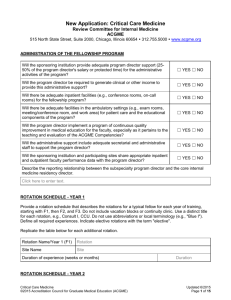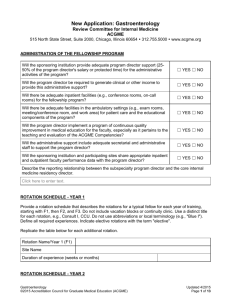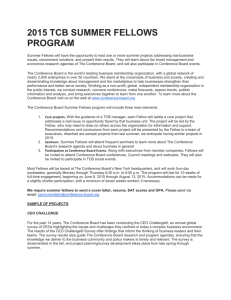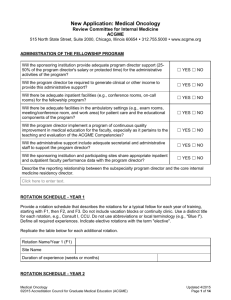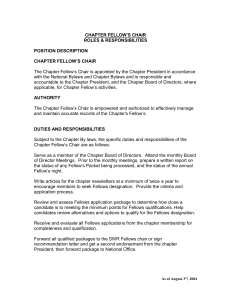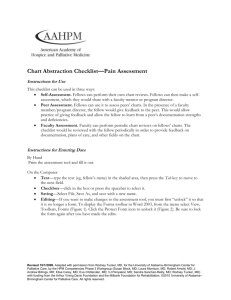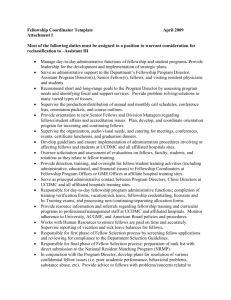Endocrinology, Diabetes, and Metabolism
advertisement
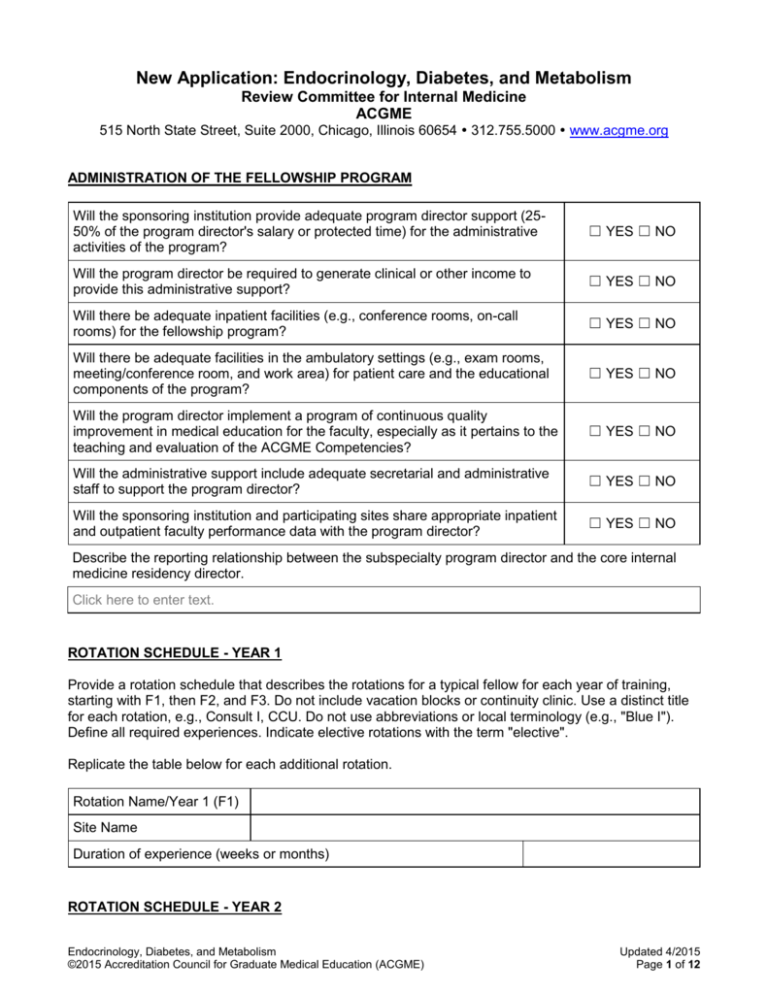
New Application: Endocrinology, Diabetes, and Metabolism Review Committee for Internal Medicine ACGME 515 North State Street, Suite 2000, Chicago, Illinois 60654 312.755.5000 www.acgme.org ADMINISTRATION OF THE FELLOWSHIP PROGRAM Will the sponsoring institution provide adequate program director support (2550% of the program director's salary or protected time) for the administrative activities of the program? ☐ YES ☐ NO Will the program director be required to generate clinical or other income to provide this administrative support? ☐ YES ☐ NO Will there be adequate inpatient facilities (e.g., conference rooms, on-call rooms) for the fellowship program? ☐ YES ☐ NO Will there be adequate facilities in the ambulatory settings (e.g., exam rooms, meeting/conference room, and work area) for patient care and the educational components of the program? ☐ YES ☐ NO Will the program director implement a program of continuous quality improvement in medical education for the faculty, especially as it pertains to the teaching and evaluation of the ACGME Competencies? ☐ YES ☐ NO Will the administrative support include adequate secretarial and administrative staff to support the program director? ☐ YES ☐ NO Will the sponsoring institution and participating sites share appropriate inpatient and outpatient faculty performance data with the program director? ☐ YES ☐ NO Describe the reporting relationship between the subspecialty program director and the core internal medicine residency director. Click here to enter text. ROTATION SCHEDULE - YEAR 1 Provide a rotation schedule that describes the rotations for a typical fellow for each year of training, starting with F1, then F2, and F3. Do not include vacation blocks or continuity clinic. Use a distinct title for each rotation, e.g., Consult I, CCU. Do not use abbreviations or local terminology (e.g., "Blue I"). Define all required experiences. Indicate elective rotations with the term "elective". Replicate the table below for each additional rotation. Rotation Name/Year 1 (F1) Site Name Duration of experience (weeks or months) ROTATION SCHEDULE - YEAR 2 Endocrinology, Diabetes, and Metabolism ©2015 Accreditation Council for Graduate Medical Education (ACGME) Updated 4/2015 Page 1 of 12 Provide a rotation schedule that describes the rotations for a typical fellow for each year of training, starting with F1, then F2, and F3. Do not include vacation blocks or continuity clinic. Use a distinct title for each rotation, e.g., Consult I, CCU. Do not use abbreviations or local terminology (e.g., "Blue I"). Define all required experiences. Indicate elective rotations with the term "elective". Replicate the table below for each additional rotation. Rotation Name/Year 2 (F2) Site Name Duration of experience (weeks or months) ROTATION SCHEDULE - YEAR 3 Provide a rotation schedule that describes the rotations for a typical fellow for each year of training, starting with F1, then F2, and F3. Do not include vacation blocks or continuity clinic. Use a distinct title for each rotation, e.g., Consult I, CCU. Do not use abbreviations or local terminology (e.g., "Blue I"). Define all required experiences. Indicate elective rotations with the term "elective". Replicate the table below for each additional rotation. Rotation Name/Year 3 (F3) Site Name Duration of experience (weeks or months) ROTATION SCHEDULE NARRATIVE If the questions in this section or their format do not permit you to describe accurately or optimally the rotations in your training program, provide a narrative that more completely or accurately describes this particular component of your program. (200 word limit) Click here to enter text. If the program will have home-call, then explain how time will be monitored to assure compliance with the 80-hour work week and one-day off in seven. Click here to enter text. Explain the back-up support systems that will be provided when patient care responsibilities are unusually difficult or prolonged, or if unexpected circumstances create fellow fatigue sufficient to jeopardize patient care. Click here to enter text. CONTINUITY CLINIC EXPERIENCES Endocrinology, Diabetes, and Metabolism ©2015 Accreditation Council for Graduate Medical Education (ACGME) Updated 4/2015 Page 2 of 12 Provide information for the fellows' continuity experience and patient distribution for all years of training. List each experience indicating the name of the experiences (e.g., Continuity Clinic, Other), site name, duration of the experience, number of ½ day sessions per week, average number of patients seen per session, whether faculty supervision is provided for each experience, and the percent of female patients. Site #1 Name of Experience: Experience Site #2 Experience Site #3 Experience Site #4 Experience Site #5 Experience Site #6 Experience Duration (weeks): # # # # # # ½ day sessions per week: # # # # # # Average patients seen per session: # # # # # # On-site concurrent faculty supervision present? ☐Y☐N ☐Y☐N ☐Y☐N ☐Y☐N ☐Y☐N ☐Y☐N % Female: #% #% #% #% #% #% OTHER AMBULATORY EXPERIENCE Provide information for the fellows' other ambulatory experience and patient distribution for all years of training. List each experience indicating the name of the experiences (e.g., Continuity Clinic, Other), site name, duration of the experience, number of ½ day sessions per week, average number of patients seen per session, whether faculty supervision is provided for each experience, and the percent of female patients. Site #1 Name of Experience: Experience Site #2 Experience Site #3 Experience Site #4 Experience Site #5 Experience Site #6 Experience Duration (weeks): # # # # # # ½ day sessions per week: # # # # # # Average patients seen per session: # # # # # # Endocrinology, Diabetes, and Metabolism ©2015 Accreditation Council for Graduate Medical Education (ACGME) Updated 4/2015 Page 3 of 12 Site #1 Site #2 Site #3 Site #4 Site #5 Site #6 On-site concurrent faculty supervision present? ☐Y☐N ☐Y☐N ☐Y☐N ☐Y☐N ☐Y☐N ☐Y☐N % Female: #% #% #% #% #% #% EVALUATION - ADDITIONAL INFORMATION Provide information on your methods for evaluating fellows, teaching attendings and other faculty members, your recording methods, access rules, and follow-up actions taken to remediate problems. Will the program director review fellow procedure logs in order to document that each fellow has performed the minimum number and achieved competence in invasive procedures? ☐ YES ☐ NO Will written records be kept of the following? Evaluation of fellows longitudinal experience (at least every 6 months) ☐ YES ☐ NO Other counseling sessions of a fellow by the program director ☐ YES ☐ NO Do teaching attendings always provide the program director with written evaluations of the fellow's performance? ☐ YES ☐ NO Faculty Evaluation Will teaching attendings be evaluated by the fellows whom they supervise at the end of each rotation, and during each longitudinal experience? ☐ YES ☐ NO Will these evaluations be written and confidential? ☐ YES ☐ NO Will the results of these evaluations be communicated on a regular basis, at least annually, to faculty members? ☐ YES ☐ NO EVALUATION NARRATIVE Describe the mechanism for monitoring fellows' stress, including mental or emotional conditions inhibiting performance or learning and drug-or alcohol-related dysfunction. Click here to enter text. Describe the method for assessment of procedural competence. Click here to enter text. Endocrinology, Diabetes, and Metabolism ©2015 Accreditation Council for Graduate Medical Education (ACGME) Updated 4/2015 Page 4 of 12 Describe the process for reviewing program goals and objectives, and the effectiveness with which they are achieved. Click here to enter text. INSTITUTION INFORMATION Provide the following information for all participating sites. Site #1 Site #2 Site #3 Site #4 Site #5 Site #6 Will clinical records that document both inpatient and ambulatory be readily available at all times? ☐Y☐N ☐Y☐N ☐Y☐N ☐Y☐N ☐Y☐N ☐Y☐N Will fellows have access to an electronic health record? ☐Y☐N ☐Y☐N ☐Y☐N ☐Y☐N ☐Y☐N ☐Y☐N Medical Records Facilities – Will the following facilities/laboratories/resources be available? Imaging facilities for bone density ☐Y☐N ☐Y☐N ☐Y☐N ☐Y☐N ☐Y☐N ☐Y☐N Imaging facilities for nuclear medicine ☐Y☐N ☐Y☐N ☐Y☐N ☐Y☐N ☐Y☐N ☐Y☐N Imaging facilities for radiologic ☐Y☐N ☐Y☐N ☐Y☐N ☐Y☐N ☐Y☐N ☐Y☐N Imaging facilities for ultrasound ☐Y☐N ☐Y☐N ☐Y☐N ☐Y☐N ☐Y☐N ☐Y☐N Laboratory facilities for Hormonal immunoassay ☐Y☐N ☐Y☐N ☐Y☐N ☐Y☐N ☐Y☐N ☐Y☐N Laboratory facilities for immunohistologic studies ☐Y☐N ☐Y☐N ☐Y☐N ☐Y☐N ☐Y☐N ☐Y☐N Laboratory facilities for karyotyping ☐Y☐N ☐Y☐N ☐Y☐N ☐Y☐N ☐Y☐N ☐Y☐N Dietary and/or nutrition service ☐Y☐N ☐Y☐N ☐Y☐N ☐Y☐N ☐Y☐N ☐Y☐N Nephrology service ☐Y☐N ☐Y☐N ☐Y☐N ☐Y☐N ☐Y☐N ☐Y☐N Neurology and neurosurgery service ☐Y☐N ☐Y☐N ☐Y☐N ☐Y☐N ☐Y☐N ☐Y☐N Obstetrics and gynecology services ☐Y☐N ☐Y☐N ☐Y☐N ☐Y☐N ☐Y☐N ☐Y☐N Ophthalmology service ☐Y☐N ☐Y☐N ☐Y☐N ☐Y☐N ☐Y☐N ☐Y☐N Endocrinology, Diabetes, and Metabolism ©2015 Accreditation Council for Graduate Medical Education (ACGME) Updated 4/2015 Page 5 of 12 Site #1 Site #2 Site #3 Site #4 Site #5 Site #6 Pediatrics service ☐Y☐N ☐Y☐N ☐Y☐N ☐Y☐N ☐Y☐N ☐Y☐N Podiatry ☐Y☐N ☐Y☐N ☐Y☐N ☐Y☐N ☐Y☐N ☐Y☐N Surgery ☐Y☐N ☐Y☐N ☐Y☐N ☐Y☐N ☐Y☐N ☐Y☐N Urology service ☐Y☐N ☐Y☐N ☐Y☐N ☐Y☐N ☐Y☐N ☐Y☐N Access to training using simulation ☐Y☐N ☐Y☐N ☐Y☐N ☐Y☐N ☐Y☐N ☐Y☐N Geriatric patients within the patient population ☐Y☐N ☐Y☐N ☐Y☐N ☐Y☐N ☐Y☐N ☐Y☐N Inpatients with a full range of endocrinologic disorders ☐Y☐N ☐Y☐N ☐Y☐N ☐Y☐N ☐Y☐N ☐Y☐N Outpatients with a full range of endocrinologic disorders ☐Y☐N ☐Y☐N ☐Y☐N ☐Y☐N ☐Y☐N ☐Y☐N GENERAL COMPETENCIES - INTERNAL MEDICINE Practice-Based Learning and Improvement Describe one learning activity in which residents will engage in to identify strengths, deficiencies, and limits in their knowledge and expertise (self-reflection and self-assessment); set learning and improvement goals; identify and perform appropriate learning activities to achieve self-identified goals (life-long learning). Click here to enter text. Describe one example of a learning activity in which residents will engage to develop the skills needed to use information technology to locate, appraise, and assimilate evidence from scientific studies and apply it to their patients' health problems. The description should include: 1. 2. 3. 4. 5. locate information use information technology Appraise information assimilate evidence information (from scientific studies) apply information to patient care Click here to enter text. Give one example and the outcome of a planned quality improvement activity or project in which at least one resident will participate in that will require the resident to demonstrate an ability to analyze, improve and change practice or patient care. Describe planning, implementation, evaluation and provisions of faculty support and supervision that will guide this process. Click here to enter text. Describe how residents will: Endocrinology, Diabetes, and Metabolism ©2015 Accreditation Council for Graduate Medical Education (ACGME) Updated 4/2015 Page 6 of 12 a) develop teaching skills necessary to educate patients, families, students, and other residents; b) teach patients, families, and others; and c) receive and incorporate formative evaluation feedback into daily practice. (If a specific tool is used to evaluate these skills have it available for review by the site visitor.) Click here to enter text. Interpersonal and Communication Skills Describe one learning activity in which residents will develop competence in communicating effectively with patients and families across a broad range of socioeconomic and cultural backgrounds; with physicians, other health professionals, and health related agencies. Click here to enter text. Describe one learning activity in which residents will develop their skills and habits to work effectively as a member or leader of a health care team or other professional group. In the example, identify the members of the team, responsibilities of the team members, and how team members communicate to accomplish responsibilities. Click here to enter text. Explain (a) how the completion of comprehensive, timely and legible medical records will be monitored and evaluated, and (b) the mechanism for providing residents feedback on their ability to competently maintain medical records. Click here to enter text. Will the program use both direct observation and multi-source evaluation, including patients, peers, and non-physician team members, to assess fellow performance in communicating with patients and their families? ☐ YES ☐ NO Will the program use both direct observation and multi-source evaluation, including patients, peers, and non-physician team members, to assess fellow performance in teamwork? ☐ YES ☐ NO Will the program use both direct observation and multi-source evaluation, including patients, peers, and non-physician team members, to assess fellow performance in communicating with peers, including transitions of care? ☐ YES ☐ NO Will the program use both direct observation and multi-source evaluation, including patients, peers, and non-physician team members, to assess fellow performance in record keeping? ☐ YES ☐ NO Professionalism Describe at least one learning activity, other than lecture, by which residents will develop a commitment to carrying out professional responsibilities and an adherence to ethical principles. Click here to enter text. Endocrinology, Diabetes, and Metabolism ©2015 Accreditation Council for Graduate Medical Education (ACGME) Updated 4/2015 Page 7 of 12 How will the program promote professional behavior by the residents and faculty? Click here to enter text. How will lapses in these behaviors be addressed? Click here to enter text. Will the program use multi-source evaluation, including patients, peers, and non-physician team members, to assess each fellow's honesty and integrity? ☐ YES ☐ NO Will the program use multi-source evaluation, including patients, peers, and non-physician team members, to assess each fellow's ability to meet professional responsibilities? ☐ YES ☐ NO Will the program use multi-source evaluation, including patients, peers, and non-physician team members, to assess each fellow's ability to maintain appropriate professional relationships with patients and colleagues? ☐ YES ☐ NO Will the program use multi-source evaluation, including patients, peers, and non-physician team members, to assess each fellow's commitment to selfimprovement? ☐ YES ☐ NO Systems-based Practice Describe the learning activity(ies) through which residents will achieve competence in the elements of systems-based practice: work effectively in various health care delivery settings and systems, coordinate patient care within the health care system; incorporate considerations of cost-containment and risk-benefit analysis in patient care; and, advocate for quality patient care and optimal patient care systems and work in interprofessional teams to enhance patient safety and care quality. Click here to enter text. Describe an activity that will fulfill the requirement for experiential learning in identifying system errors. Click here to enter text. Will the program use multi-source evaluation, including peers, and nonphysician team members, to assess each fellow's ability to provide care coordination, including transition of care? ☐ YES ☐ NO Will the program use multi-source evaluation, including peers, and nonphysician team members, to assess each fellow's ability to work in interdisciplinary teams? ☐ YES ☐ NO Will the program use multi-source evaluation, including peers, and nonphysician team members, to assess each fellow's advocacy for quality of care? ☐ YES ☐ NO Will the program use multi-source evaluation, including peers, and nonphysician team members, to assess each fellow's ability to identify system problems and participate in improvement activities? ☐ YES ☐ NO Endocrinology, Diabetes, and Metabolism ©2015 Accreditation Council for Graduate Medical Education (ACGME) Updated 4/2015 Page 8 of 12 Will the fellows' performance in continuity clinic be reviewed with them verbally and in writing at least semiannually? (Leave blank if not applicable) ☐ YES ☐ NO Competency Evaluation Narrative If the questions in this section or their format do not permit you to describe accurately or optimally your evaluation method(s) of fellows in any of the competencies listed above, provide a narrative that more completely or accurately describes the evaluation method(s). Click here to enter text. EDUCATIONAL PROGRAM Provide the written curriculum information about the curriculum: Will the overall goals and objectives be distributed to faculty and fellows annually? ☐ YES ☐ NO Will the goals and objectives be reviewed by the fellows at the start of each new rotation/assignment? ☐ YES ☐ NO Will fellows routinely participate in the following conferences: Core Curriculum Conference Series ☐ YES ☐ NO Clinical Case Conferences ☐ YES ☐ NO Research Conferences ☐ YES ☐ NO Journal Club ☐ YES ☐ NO Morbidity and Mortality Conferences ☐ YES ☐ NO Quality Improvement Conferences ☐ YES ☐ NO Will the faculty participate in required conferences? ☐ YES ☐ NO Will fellows demonstrate knowledge of the following? Basic laboratory techniques, including quality control, quality assurance, and proficiency ☐ YES ☐ NO Biochemistry and physiology, including cell and molecular biology and immunology, as they relate to endocrinology and metabolism ☐ YES ☐ NO Developmental endocrinology, including growth and development, sexual differentiation, and pubertal maturation ☐ YES ☐ NO Endocrine adaptations and maladaptations to systemic diseases ☐ YES ☐ NO Endocrinology, Diabetes, and Metabolism ©2015 Accreditation Council for Graduate Medical Education (ACGME) Updated 4/2015 Page 9 of 12 Endocrine aspects of psychiatric diseases ☐ YES ☐ NO Endocrine physiology and pathophysiology in systemic diseases and principles of hormone action ☐ YES ☐ NO Genetics as it relates to endocrine diseases ☐ YES ☐ NO Pathogenesis and epidemiology of diabetes mellitus ☐ YES ☐ NO Signal transduction pathways and biology of hormone receptors ☐ YES ☐ NO Whole organ and islet cell pancreatic transplantation ☐ YES ☐ NO How many months are devoted to clinical experiences? # When averaged over the 2 years of training, how many half-day sessions of ambulatory care, which includes continuity ambulatory care, does the program include for each fellow per week? # Will fellows demonstrate competence in the evaluation and management of hormonal problems including diseases, infections, neoplasms and other causes of dysfunction of the following endocrine organs? Adrenal cortex and medulla ☐ YES ☐ NO Hypothalamus and pituitary ☐ YES ☐ NO Ovaries and testes ☐ YES ☐ NO Pancreatic islets ☐ YES ☐ NO Parathyroid ☐ YES ☐ NO Thyroid ☐ YES ☐ NO Will fellows demonstrate competence in the care of patients with type-1 and type-2 diabetes including: Diabetes detection and management during pregnancy ☐ YES ☐ NO Evaluation and management of acute, life-threatening complications of hyperand hypoglycemia ☐ YES ☐ NO Evaluation and management of intensive insulin management in critical care and surgical patients ☐ YES ☐ NO Intensive management of glycemic control in the ambulatory setting ☐ YES ☐ NO Long term goals, counseling, education and monitoring ☐ YES ☐ NO Multidisciplinary diabetes education and treatment program ☐ YES ☐ NO Prevention and surveillance of microvascular and macrovascular complications ☐ YES ☐ NO Endocrinology, Diabetes, and Metabolism ©2015 Accreditation Council for Graduate Medical Education (ACGME) Updated 4/2015 Page 10 of 12 Will the fellowship program provide experience for fellows to demonstrate competence in the care of patients: Calcium, phosphorus, and magnesium imbalance ☐ YES ☐ NO Disorders of fluid, electrolyte, and acid -base metabolism ☐ YES ☐ NO Disorders of bone and mineral metabolism, with particular emphasis on the diagnosis and management of osteoporosis ☐ YES ☐ NO Gonadal disorders ☐ YES ☐ NO Nutritional disorders of obesity, anorexia nervosa, and bulimia ☐ YES ☐ NO Will the fellowship program provide experience for the fellows to demonstrate competence in the performance of the following: Diagnosis and management of ectopic hormone production ☐ YES ☐ NO Diagnosis and management of lipid and lipoprotein disorders ☐ YES ☐ NO Endocrine adaptations and maladaptations to systemic diseases ☐ YES ☐ NO Endocrine aspects of psychiatric diseases ☐ YES ☐ NO Genetic screening and counseling for endocrine and metabolic ☐ YES ☐ NO Parenteral nutrition support ☐ YES ☐ NO EDUCATIONAL PROGRAM NARRATIVE Describe how the program will ensure that the fellows have the opportunity to make up missed core conferences (e.g., when off-site). Click here to enter text. Briefly describe the conduct of Core Curriculum Conference Series in your program. Click here to enter text. Describe the program's teaching rounds; including the frequency and duration spent per week. Click here to enter text. Describe how faculty and residents will be educated about fatigue and its negative effects. Click here to enter text. PROCEDURES & TECHNICAL Endocrinology, Diabetes, and Metabolism ©2015 Accreditation Council for Graduate Medical Education (ACGME) Updated 4/2015 Page 11 of 12 For the procedures/skills listed, indicate whether instruction will be provided for fellows, and if proficiency will be documented in a log book or equivalent method. Interpretation of laboratory studies, including the effects of non-endocrine disorders on the interpretation of hormone assays instruction provided? ☐ YES ☐ NO Interpretation of laboratory studies, including the effects of non-endocrine disorders on the interpretation of hormone assays proficiency documented? ☐ YES ☐ NO Interpretation of radiologic studies used in the evaluation of patients with endocrine disorders, such as CT, MRI, and quantification of bone density instruction provided? ☐ YES ☐ NO Interpretation of radiologic studies used in the evaluation of patients with endocrine disorders, such as CT, MRI, and quantification of bone density, proficiency documented? ☐ YES ☐ NO Interpretation of thyroid biopsy instruction provided? ☐ YES ☐ NO Interpretation of thyroid biopsy, proficiency documented? ☐ YES ☐ NO Understanding the Interpretation of radiologic studies, including radionuclide localization of endocrine tissue and ultrasonography of the soft tissues of the neck instruction provided? ☐ YES ☐ NO Understanding the Interpretation of radiologic studies, including radionuclide localization of endocrine tissue and ultrasonography of the soft tissues of the neck, proficiency documented? ☐ YES ☐ NO Understanding the interpretation of stimulation and suppression tests instruction provided? ☐ YES ☐ NO Understanding the interpretation of stimulation and suppression tests proficiency documented? ☐ YES ☐ NO Endocrinology, Diabetes, and Metabolism ©2015 Accreditation Council for Graduate Medical Education (ACGME) Updated 4/2015 Page 12 of 12
